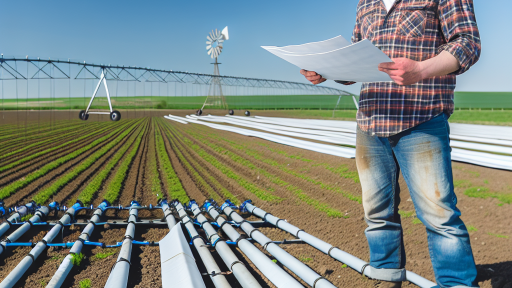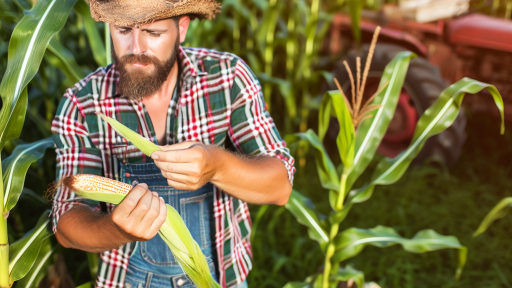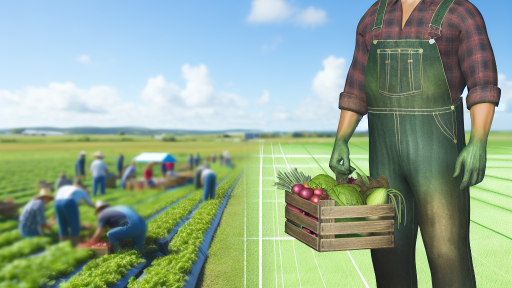Introduction to the Importance of Farm-School Connections
Connecting farms with schools enhances student learning experiences.
It fosters a deeper understanding of where food comes from.
This connection promotes healthy eating habits among students.
Moreover, it supports local farmers by creating a reliable market.
Building these relationships cultivates community engagement.
Students gain hands-on experiences that link academics to real life.
Importantly, such connections encourage environmental stewardship.
Schools can utilize farms for educational trips and activities.
Farmers can provide fresh produce for school meals.
These collaborations lead to better health outcomes for students.
Enhancing Educational Experiences
Farm visits can enhance students’ understanding of agriculture.
They can observe where their food is grown and harvested.
This exposure supports lessons in science, math, and nutrition.
Additionally, agricultural programs can offer workshops in schools.
Students learn practical skills such as gardening and cooking.
Transform Your Agribusiness
Unlock your farm's potential with expert advice tailored to your needs. Get actionable steps that drive real results.
Get StartedFostering Community Relationships
Partnerships between schools and farms build local pride.
Communities benefit from shared resources and knowledge.
Farmers share their expertise in sustainable practices.
Schools can integrate these practices into their curricula.
Events like farmer’s markets connect families with fresh produce.
Promoting Environmental Awareness
Connections with farms help teach students about sustainability.
Farm tours can highlight organic farming and local ecosystems.
Students learn about biodiversity and conservation efforts.
This awareness can inspire them to advocate for the environment.
Ultimately, it cultivates a culture of sustainability in future generations.
Benefits for Farmers: Expanding Market Access and Community Engagement
Broadened Marketing Opportunities
Connecting with schools opens new markets for farmers.
Farmers can supply fresh produce directly to local schools.
This practice helps secure steady sales throughout the year.
Moreover, it reduces food miles, benefiting the environment.
Schools often seek local sources for their meal programs.
Consequently, farmers can increase their customer base significantly.
Strengthening Community Ties
Farmers play a vital role in their communities.
Engaging with schools enhances community relationships.
Such connections promote awareness of local agriculture.
Additionally, they can foster interest in farming careers.
Schools often advocate for local produce, elevating farmers’ profiles.
These relationships contribute to a vibrant local economy.
Educational Opportunities for Students
School partnerships can provide educational benefits to students.
Farmers can participate in farm-to-school programs and workshops.
Showcase Your Farming Business
Publish your professional farming services profile on our blog for a one-time fee of $200 and reach a dedicated audience of farmers and agribusiness owners.
Publish Your ProfileThese experiences can teach students about farming practices.
Students learn the importance of nutrition and sustainability.
Hands-on experiences can spark interest in agriculture among youth.
Moreover, agricultural education can lead to healthier eating habits.
Networking and Resource Sharing
Collaboration with schools fosters networking among local farmers.
This collaboration can lead to shared resources and equipment.
Farmers can exchange best practices, improving overall efficiency.
Joint promotions can enhance visibility in the community.
Networking with educators opens doors to additional funding opportunities.
Such collaborations can lead to mutual support during challenges.
Benefits for Schools: Enhancing Educational Opportunities and Nutrition
Improved Access to Fresh Produce
Connecting schools with farms increases access to fresh, nutritious food.
Students benefit from having locally sourced items on their plates.
This connection promotes healthier eating habits among children.
Moreover, fresh produce boosts overall student well-being.
Hands-On Learning Experiences
Farm-school partnerships offer immersive learning opportunities.
Students can participate in farm visits and learn about agriculture.
Such experiences enhance their understanding of where food comes from.
Engaging in these activities fosters a sense of responsibility and care for the environment.
Curriculum Enhancement
Integrating farm connections into school curricula enriches academic programs.
Teachers can link agricultural topics to science, health, and nutrition classes.
This real-world context makes lessons more relatable and engaging for students.
Furthermore, it encourages critical thinking and problem-solving skills.
Encouraging Community Involvement
Farm connections also promote community engagement within schools.
Families can participate in events that showcase local farms.
Such events create a sense of ownership and pride in local agriculture.
Additionally, they foster relationships between farmers and school communities.
Positive Economic Impact
Partnering with local farms benefits the local economy.
Schools that support local farmers help sustain their businesses.
This collaboration contributes to a vibrant community ecosystem.
Furthermore, it encourages students to appreciate local enterprise.
Delve into the Subject: Local Food Sourcing Tools and Resources for Farmers
Strategies for Successful Partnerships: Collaborating with School Administrators
Building Relationships
Start by introducing yourself to school administrators.
Establishing a friendly rapport is essential for effective collaboration.
Regular communication keeps both parties informed.
Consider scheduling initial meetings to discuss mutual goals.
Emphasize the benefits of farm-to-school initiatives.
Understanding School Needs
Research the specific needs of each school.
Take note of the types of agricultural products that schools seek.
Engage with school cafeterias to learn about menu options.
Ask about any existing programs already in place.
Showcase Your Farming Business
Publish your professional farming services profile on our blog for a one-time fee of $200 and reach a dedicated audience of farmers and agribusiness owners.
Publish Your ProfileListen actively to understand their challenges.
Creating Collaborative Programs
Design programs that showcase local produce in meals.
Implement farm visits to educate students about agriculture.
Introduce gardening initiatives for hands-on learning.
Develop workshops where chefs and farmers work together.
Highlight the advantages of fresh, local ingredients.
Establishing Clear Objectives
Set clear, achievable goals for your partnership.
Ensure these objectives align with the school’s vision.
Track progress regularly to maintain momentum.
Adjust strategies based on feedback from school administrators.
Celebrate successes to build enthusiasm and commitment.
Engaging the Community
Involve parents and community members in your initiatives.
Host events that promote local agriculture and nutrition.
Encourage participation to create a sense of ownership.
Utilize social media to share progress and updates.
Foster a culture of community support for the partnership.
You Might Also Like: Local Food Sourcing Strategies for Small Farms
Creating Educational Programs
Farm Tours
Farm tours offer unique experiences for students.
They allow students to connect with agriculture firsthand.
During these tours, farmers should share their stories.
Students learn about farming practices and sustainability.
Farmers can incorporate interactive elements into tours.
Activities might include planting seeds or feeding animals.
Additionally, tours can help demystify food production.
Students often leave with a new appreciation for farming.
Workshops
Workshops can deepen students’ understanding of agriculture.
Farmers can lead hands-on sessions on various topics.
Topics could include soil health, crop diversity, and food safety.
Interactive lessons engage students in meaningful ways.
By using real-world examples, farmers enhance learning.
Furthermore, workshops can include cooking demonstrations.
This connects food from farm to table effectively.
Students can also create their own simple recipes.
Classroom Resources
Providing classroom resources supports ongoing learning.
Farmers can develop materials tailored to curriculum needs.
Workbooks, online resources, and videos are effective tools.
Collaboration with teachers enriches the educational content.
Additionally, farmers can get feedback from students.
This helps them refine programs and resources over time.
Utilizing local success stories highlights community impact.
Showcase Your Farming Business
Publish your professional farming services profile on our blog for a one-time fee of $200 and reach a dedicated audience of farmers and agribusiness owners.
Publish Your ProfileFarmers can inspire future generations by sharing their journey.
Gain More Insights: Sustainable Practices In Animal Farming
Logistics of Selling Local Produce to Schools
Understanding Pricing Strategies
Farmers must establish fair pricing for their produce.
Begin by analyzing your production costs, including labor, materials, and transportation.
Next, research the pricing of similar products in your area.
Consider offering discounts for bulk purchases to attract schools.
Consistent pricing helps build trust with school administrators.
Distribution Channels
Identifying effective distribution channels is crucial.
Direct delivery to schools offers convenience and freshness.
Alternatively, partnering with local food distributors can streamline logistics.
Utilize a reliable delivery schedule to maintain regular supply.
Track your shipments to ensure timely deliveries and address issues quickly.
Understanding Regulations
Familiarize yourself with local and state regulations applicable to food sales.
Comply with health and safety standards required by school districts.
Obtain necessary permits for food distribution and sales.
Stay informed about changes in regulations that may affect your business.
Attend workshops or seminars to enhance your knowledge of food regulations.
Building Relationships with Schools
Establishing good relationships with school administrators is vital.
Organize meet-and-greet events to introduce yourself and your produce.
Engage in open communication about their needs and preferences.
Provide samples of your products to encourage feedback.
Consider hosting farm tours to connect students with local agriculture.
Find Out More: Leveraging Online Platforms for Direct Farm Sales

Case Studies: Successful Farm-School Collaborations
Engaging Students at Sunny Acres Farm
Sunny Acres Farm has partnered with Maplewood High School.
This collaboration began with a field trip for students.
Students learned about sustainable farming techniques.
In addition, they participated in hands-on activities.
The farm’s owner, Emily Larson, emphasized the importance of education.
Her goal is to inspire the next generation of farmers.
Subsequently, students helped plant a vegetable garden on school grounds.
This initiative sparked interest in agriculture among students.
Growing Smiles Program at Green Patch Farm
Green Patch Farm developed the Growing Smiles program.
This program connects local schools with community gardens.
Students engage with farmers once a month.
They learn about organic farming practices.
Farmers provide workshops on nutrition and cooking.
The hands-on experience enriches their classroom learning.
Moreover, students harvest vegetables to take home.
This experience adds excitement to their meals.
Student Leadership at Oak Ridge Community Farm
Oak Ridge Community Farm offers a unique internship program.
Showcase Your Farming Business
Publish your professional farming services profile on our blog for a one-time fee of $200 and reach a dedicated audience of farmers and agribusiness owners.
Publish Your ProfileHigh school seniors apply for mentorship opportunities.
These students manage a project from start to finish.
Working closely with farmers, they gain real-world experience.
The program encourages leadership and accountability.
Additionally, students learn marketing skills for farm products.
Many interns report increased interest in agricultural careers.
This program highlights the value of practical education.
Fruits of Learning at River Valley Academy
River Valley Academy launched a farm-to-school initiative.
This project emphasizes local food sourcing for school lunches.
It includes a partnership with nearby fruit orchards.
Students visit the farms to understand food production.
They participate in apple picking during harvest season.
This exposure fosters appreciation for local agriculture.
Consequently, students advocate for healthy eating in their community.
The program has positively impacted school lunch menus.
Challenges and Solutions: Addressing Common Obstacles to Partnerships
Identifying Common Challenges
Partnerships between farms and schools often face significant barriers.
Understanding these challenges is key to creating successful collaborations.
Common hurdles include logistical issues, funding constraints, and lack of communication.
Logistical Issues
Distance between farms and schools can create transportation difficulties.
Schools may lack the resources to transport students to farms.
Moreover, farmers may struggle with scheduling visits around their busy seasons.
Possible Solutions
It is essential to establish flexible scheduling options upon initial planning.
Schools can organize virtual farm tours to overcome transportation challenges.
Farmers can consider offering delivery of fresh produce directly to schools.
Funding Constraints
Budget limitations often hinder the establishment of partnerships.
Many schools have tight funding for agricultural education programs.
Farmers may also face financial challenges in participating in these initiatives.
Possible Solutions
Identifying grants and funding opportunities can alleviate financial burdens.
Collaboration between multiple farms can spread costs and resources.
Farmers can seek sponsorships from local businesses interested in supporting education.
Lack of Communication
Effective communication is vital for the success of any partnership.
Sometimes, farmers and educators operate in silos, missing opportunities for synergy.
This disconnect can result in misunderstandings about goals and expectations.
Possible Solutions
Regular meetings can facilitate open communication and clear expectations.
Utilizing digital platforms can streamline information sharing between parties.
Proactive outreach from both sides can foster better relationships and collaboration.
Future Trends: The Role of Technology in Connecting Farms and Schools
Innovative Communication Platforms
Technology enables better communication between farmers and schools.
Farmers can use dedicated apps to share updates and educational resources.
These platforms foster engagement and collaboration.
Schools benefit by accessing local produce and nutrition information.
Showcase Your Farming Business
Publish your professional farming services profile on our blog for a one-time fee of $200 and reach a dedicated audience of farmers and agribusiness owners.
Publish Your ProfileVirtual Farm Tours
Virtual reality can enhance learning experiences for students.
Farmers can offer virtual tours of their operations.
This method allows students to explore farming practices safely.
Additionally, it creates a direct connection with food sources.
Data-Driven Approaches
Data analytics can enhance farm management and educational programs.
Farmers can track crop yields and share insights with schools.
This information can inform curricula on agriculture and nutrition.
Moreover, data fosters transparency about food sourcing.
Sustainable Practices and Technology
Technology promotes sustainable farming methods.
Schools can partner with farmers who utilize these practices.
This collaboration encourages environmental stewardship in students.
Students learn about sustainable agriculture through firsthand experience.
Enhancing Agricultural Education
Technology provides resources for agricultural education in schools.
Farmers can contribute to lesson plans and workshops.
These initiatives inspire the next generation of agricultural leaders.
Moreover, they promote healthy lifestyle choices among students.
Building Stronger Community Ties
Technology strengthens community connections between farmers and schools.
Collaborative events can utilize social media for outreach.
This increases awareness of local agricultural programs.
Ultimately, it fosters a sense of community and support.
Additional Resources
+Rainbow Farms – Edible New Mexico




